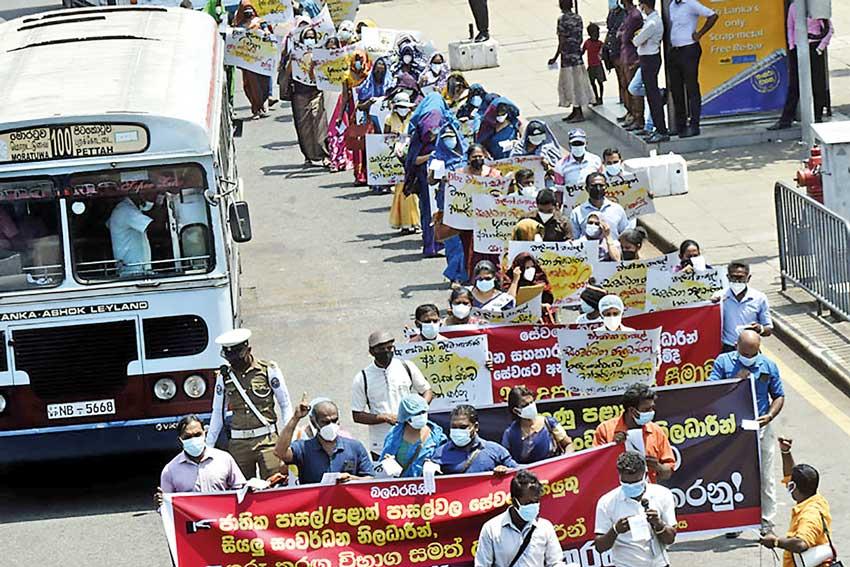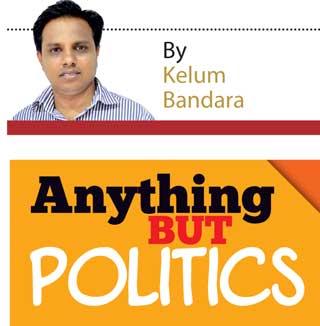24 Feb 2022 - {{hitsCtrl.values.hits}}

Their main grouse is with Finance Minister Basil Rajapaksa who is now calling the shots on behalf of the government as far as economic affairs are concerned
It is no brainer then that ordinary folks are disgruntled and critical of the government. When public resentment is high, the parties across the political divide feel it and try to deploy their political tools to attract them for fresh political agendas targeting future elections
In the midst of this worsening economic crisis and political confusion, the 11- party alliance of the government has embarked on a political course of action. It bears the hallmarks of a future fully-fledged political alliance
 Along with the economic crisis which shows no sign of early recovery, political confusion reigns in the government making it impossible for it to get its act together. The country is going through probably the worst ever economic hardships triggered not only by the lack of foreign exchange but also rupee revenue to the state coffers. The situation is grim so much so that it can be likened to ad hoc running of a grocery shop with its meagre, unsteady income. People feel the brunt of the economic impact in terms of soaring cost of living, lack of some essentials, and more importantly, even shortage of fuel for routine requirements.
Along with the economic crisis which shows no sign of early recovery, political confusion reigns in the government making it impossible for it to get its act together. The country is going through probably the worst ever economic hardships triggered not only by the lack of foreign exchange but also rupee revenue to the state coffers. The situation is grim so much so that it can be likened to ad hoc running of a grocery shop with its meagre, unsteady income. People feel the brunt of the economic impact in terms of soaring cost of living, lack of some essentials, and more importantly, even shortage of fuel for routine requirements.
To make matters worse for the government, cohesion is missing in the government. Lack of political will has added to the crisis. Its minor and minority alliance partners are a dissenting group within today. Their main grouse is with Finance Minister Basil Rajapaksa who is now calling the shots on behalf of the government as far as economic affairs are concerned. When he was appointed Finance Minister last year replacing his brother Prime Minister Mahinda Rajapaksa, his close aides created the hype that he would do wonders to turn around the economy that was reeling both under the impact of the pandemic and mismanagement. But, no tangible result was achieved on the ground, contrary to the expectation of his loyalists who are mostly the back-benchers of the governing party.
The gravity of the current crisis was so serious that no short term solution could help the country get over it.
It is no brainer then that ordinary folks are disgruntled and critical of the government. When public resentment is high, the parties across the political divide feel it and try to deploy their political tools to attract them for fresh political agendas targeting future elections. The opposition parties obviously believe that such anti-incumbency feelings will translate into their advantage no matter what. Within the opposition, there is a contest in this exercise.
The parties, namely Samagi Jana Balawegaya (SJB) and the JVP-led National People’s Power, have revved up their political engines to rally the people behind them. Elections are not around the corner. People mostly sound disillusioned with politics in general. Political ground-works by aspiring parties are well underway. It is not the case only with the opposition. Dissension within the government that remained simmering over a period has now reached boiling point.
In the midst of this worsening economic crisis and political confusion, the 11- party alliance of the government has embarked on a political course of action. It bears the hallmarks of a future fully-fledged political alliance.
The new alliance of the constituent parties of the government comprise key players such as Industry Minister Wimal Weerawansa of National Freedom Front (NFF), Energy Minister Udaya Gammanpila of Pivithuru Hela Urumaya (PHU) and Water Supply Minister Vasudeva Nanayakkara of the National Democratic Front .
The others are Venerable Athuraliye Rathana Thero of the Ape Janabala Pakshaya, Prof Tissa Vitharana of the Lanka Sama Samaja Party, A L M Athaulla of the National Congress, Tiran Alles of the United People’s Party, Dr. G. Weerasinghe of the Sri Lanka Communist Party, Asanka Nawaratne of the Sri Lanka People’s Party, and Gevindu Cumaratunge of the Yuthukama national organisation.
The alliance conducted two main public discourses during the past few months spelling new policy lines independent of the government. The leaders of these parties and organisations are harsh on the government and its affairs.
Now the alliance is working for the presentation of a set of proposals to the government at a ceremony scheduled for March 2 in Colombo. The new set of proposals are aimed at what a party leader said ‘Social Transformation, Upholding Nationalism and Democracy’.
The document is titled ‘Ratama Hari Magata (The country in the right direction). As such it is meant to change the present way of running the country. One of their key demands, as reported, is banning dual citizens from holding key positions in the government. In the present Cabinet, only Finance Minister Basil Rajapaksa is the only dual citizen.
Recently, the Professionals National Front (PNF), a collective of organisations that backed this government at the elections, asked President Gotabaya Rajapaksa in writing to remove him from office.
The finance minister is also someone who has undertaken mobilisation of people at grassroots level in anticipation of local elections. The implementation of 100,000 projects covering each Grama Niladhari Division is interpreted by the political opposition as nothing but an election gimmick.
The 11-party alliance is highly unlikely to see eye-to-eye with Mr. Rajapaksa in future politics though they are parts of the same establishment today. They may not be ready to be part of a political formation led by Mr. Basil Rajapaksa in the future. They find both policy and altitudinal differences with him.
Hence, the latest exercise by the 11-party alliance will be a stepping stone to a novel political formation probably targeting national minded , left leaning people .
27 Nov 2024 6 hours ago
27 Nov 2024 7 hours ago
27 Nov 2024 7 hours ago
27 Nov 2024 8 hours ago
27 Nov 2024 8 hours ago